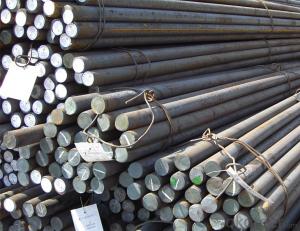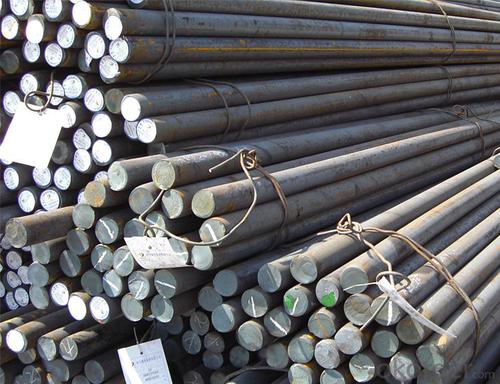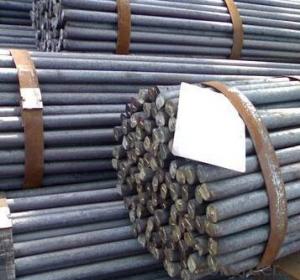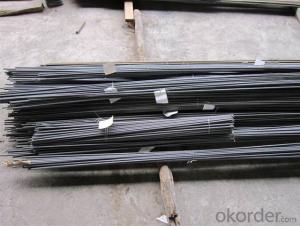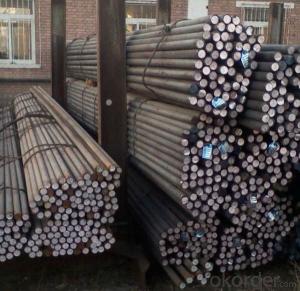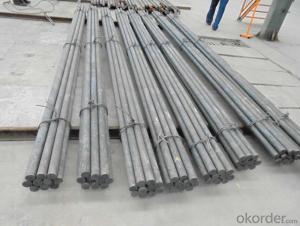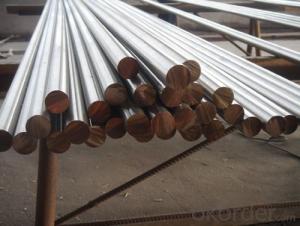Round Bar Reinforcing Steel Bars Q195 Special Steel
- Loading Port:
- China main port
- Payment Terms:
- TT OR LC
- Min Order Qty:
- 30 m.t.
- Supply Capability:
- 10000 m.t./month
OKorder Service Pledge
OKorder Financial Service
You Might Also Like
Specification
Chemical composition of steel bar
| Standard | C | Si | Mn | Cr | Ni | P/S ≤ |
| DIN | ≤0.15 | ≤1.0 | ≤2.0 | 18 | 9 | 0.03 |
| GB | ≤0.15 | ≤1.0 | ≤2.0 | 18 | 9 | 0.03 |
Product show
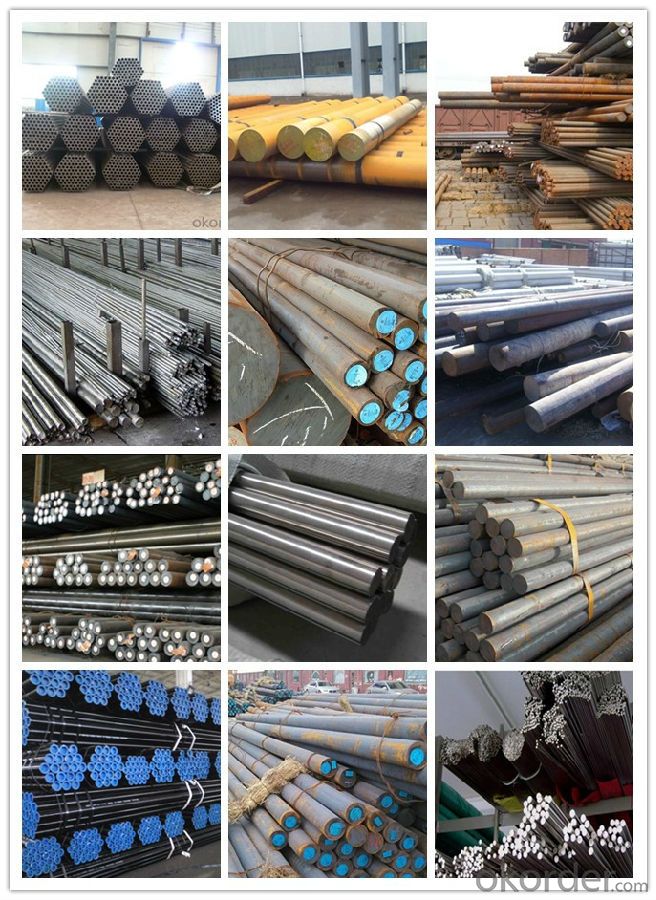
Workshop show
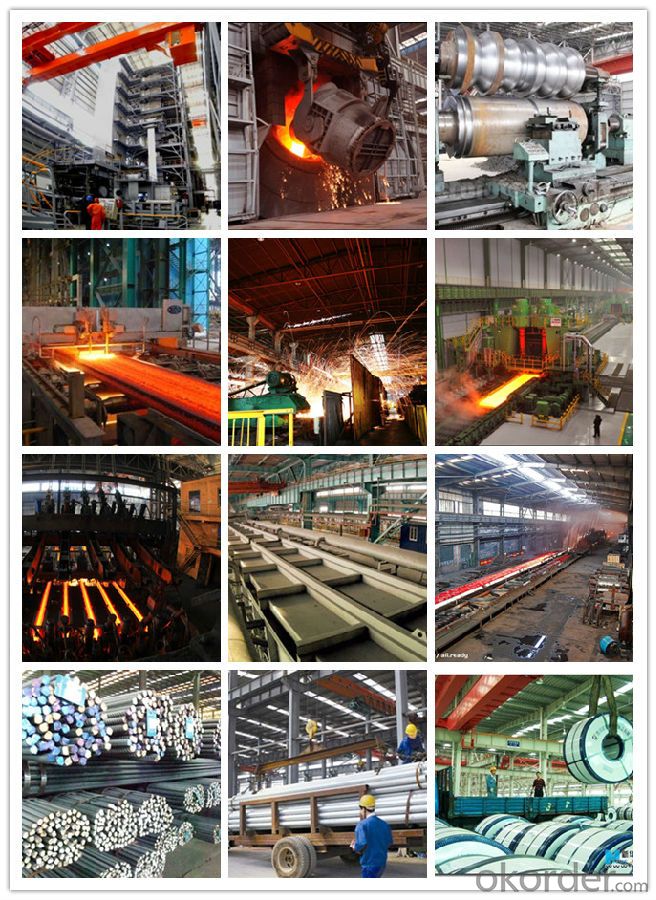
Shipping
1. FedEx/DHL/UPS/TNT for samples, Door-to-Door;
2. By Air or by Sea for batch goods, for FCL; Airport/ Port receiving;
3. Customers specifying freight forwarders or negotiable shipping methods!
Delivery Time: 3-7 days for samples; 5-25 days for batch goods.
Payment Terms
1.Payment: T/T, L/C, Western Union, MoneyGram,PayPal; 30% deposits; 70% balance before delivery.
2.MOQ: 1pcs
3.Warranty : 3 years
4.Package Informations: 1) EXPORT, In 20 feet (GW 25 ton) or 40 feet Container (GW 25 ton)
2)as customer's requirement
Main Product
Plastic Mould Steel
DIN 1.2311,1.2738,1.2083,1.2316 etc.
AISI P20,P20+Ni,420 etc.
JIS SUS420J2
Hot Work Steel
DIN 1.2344,1.2343,1.2367,1.2365,1.2581,1.2713 etc.
AISI H13,H11,H10,H21, etc.
JIS SKD61,SKD6,SKD5,SKT4 etc.
Cold Work Steel
DIN 1.2739, 1.2601, 1.2080, 1.2436, 1.2631, 1.263, 1.2510, 1.2327 etc.
AISI D2, D5, D3, D6, A8, A2, O1 etc.
JIS SKD10, SKD11, SKD1, SKS3 etc.
High Speed Steel
DIN 1.3343, 1.3243, 1.3247, 1.3355 etc.
AISI M2, M35, M42, T1 etc.
JIS SKH51, SKH35, SKH59, SKH2 etc.
Alloy Structural Steel
DIN 1.7035,1.6511,1.7220,1.7225 etc.
AISI 5140, 4340, 4135, 4140 etc.
JIS SCr440,SNCM439,SCM435,SCM440 etc.
Stainless & Carbon Steel or Others
DIN 1.4125,1.1191 etc
AISI 440C,1045, 1020 etc.
JIS SUS440C,S45C etc
Why choose us?
(1) The leading exporter in China special steel industry.
(2) Large stocks for various sizes, fast delivery date.
(3) Good business relationship with China famous factories.
(4) More than 7 years steel exporting experience.
(5) Good after-sales service guarantee.
- Q: Can special steel be used in the production of gears?
- Yes, special steel can be used in the production of gears. Special steel, such as alloy steel or tool steel, is often preferred in gear manufacturing due to its high strength, wear resistance, and ability to withstand heavy loads and high temperatures. This steel type ensures gears have the necessary durability and performance required for various applications.
- Q: How does special steel contribute to the marine industry?
- The marine industry greatly relies on special steel due to its exceptional strength, durability, and corrosion resistance, which are vital qualities for various marine applications. A significant role of special steel in the marine industry lies in the building of ships and submarines. These vessels face harsh environmental conditions, such as exposure to saltwater, extreme temperatures, and high pressures. Special steel, such as high-strength low-alloy (HSLA) steel or stainless steel, ensures the structural integrity of these vessels and improves their overall performance. The high strength-to-weight ratio of the steel allows for the creation of lighter yet sturdy hulls, enabling ships and submarines to navigate rough seas more effectively. In addition, special steel is extensively used in marine equipment and components. For instance, it is utilized in the manufacturing of propeller shafts, rudders, and other crucial parts that need to withstand the forces exerted by water. Stainless steel, with its corrosion-resistant properties, is ideal for various marine fittings like valves, fasteners, and pipes, guaranteeing longevity and efficient operation in highly corrosive marine environments. Furthermore, special steel finds applications in offshore structures such as oil rigs, platforms, and wind turbines. These structures must endure harsh conditions like strong ocean currents, heavy waves, and corrosive saltwater. Special steel grades like carbon-manganese steel or weathering steel are specifically designed to provide exceptional strength and corrosion resistance, making them suitable for offshore installations. Lastly, in the marine industry, special steel is indispensable for fabricating marine containers and cargo handling equipment. The steel's high tensile strength and impact resistance ensure the safe transportation of goods by sea, making sure that containers can withstand dynamic forces during shipping and protect the cargo from water intrusion. All in all, special steel's unique properties make it an essential material in the marine industry. Its strength, durability, and corrosion resistance significantly contribute to the construction of ships, submarines, offshore structures, marine equipment, and cargo containers, enabling safe and efficient maritime operations.
- Q: How does free-cutting steel improve machinability?
- Free-cutting steel improves machinability by having a higher sulfur content, which acts as a lubricant during the machining process. This reduces friction and heat generation, leading to improved chip formation and easier cutting, resulting in higher cutting speeds, improved surface finish, and extended tool life.
- Q: What are the main applications of special steel in the packaging machinery?
- Special steel is widely used in packaging machinery due to its outstanding properties such as high strength, corrosion resistance, and durability. It is primarily utilized in the construction of machine components like blades, dies, and molds, ensuring efficient and precise cutting, shaping, and forming of packaging materials. Additionally, special steel's ability to withstand high temperatures and extreme pressures make it suitable for applications requiring heat sealing or sterilization of packaging. Overall, special steel plays a crucial role in enhancing the performance, reliability, and longevity of packaging machinery.
- Q: What are the properties of cobalt-based alloys?
- Cobalt-based alloys possess excellent strength, corrosion resistance, and high-temperature stability, making them suitable for various applications such as aerospace, medical implants, and industrial machinery. They also exhibit magnetic properties, good wear resistance, and the ability to withstand extreme environments, making them highly versatile and sought after in various industries.
- Q: What are the different surface cleaning methods for special steel?
- There are several surface cleaning methods that can be used for special steel to maintain its quality and appearance. 1. Mechanical Cleaning: This method involves the use of mechanical tools such as wire brushes, sandpaper, or abrasive pads to remove dirt, rust, or other contaminants from the surface of the steel. It is effective for removing loose particles and light stains but may not be suitable for deep stains or stubborn dirt. 2. Chemical Cleaning: Chemical cleaning is a common method used for special steel surfaces. It involves the use of specific chemical solutions that are applied to the surface to dissolve and remove contaminants. Different chemicals are used depending on the type of stain or dirt present. Acid-based cleaners are often used for rust removal, while alkaline cleaners are effective for removing grease or oil stains. 3. Electrochemical Cleaning: This method utilizes an electrical current to remove contaminants from the surface of the steel. It involves placing the steel in an electrolyte solution and applying a direct current, causing the contaminants to dissolve and separate from the surface. This method is effective for removing rust or corrosion but should be carefully monitored to prevent damage to the steel. 4. High-Pressure Water Cleaning: High-pressure water cleaning, also known as water blasting, involves the use of pressurized water to remove dirt, paint, or other contaminants from the steel surface. This method is effective for removing heavy stains or coatings and is commonly used in industrial cleaning processes. 5. Steam Cleaning: Steam cleaning is a non-abrasive method that utilizes high-temperature steam to loosen and remove dirt, grease, or other contaminants from the steel surface. It is a gentle method that can effectively clean delicate or sensitive surfaces without causing damage. It is important to note that the appropriate surface cleaning method for special steel depends on the specific type of steel, the nature of the contaminants, and the desired level of cleaning. It is recommended to consult with experts or follow manufacturer guidelines to ensure the best cleaning method is used for a particular type of special steel.
- Q: How does special steel contribute to sustainability efforts?
- Special steel is a key player in sustainability initiatives for various reasons. To begin with, its durability and long lifespan make it highly sought after. It boasts exceptional resistance to corrosion, wear, and tear, enabling it to endure harsh conditions and heavy use. By prolonging the lifespan of products made with special steel, the need for frequent replacements is minimized. Consequently, this conserves natural resources and diminishes environmental impact by reducing resource consumption and waste generation. Furthermore, special steel is renowned for its recyclability. It can be melted down and reprocessed multiple times without compromising its properties or quality. This quality makes it a valuable material within the circular economy, where resources are reused and recycled to reduce reliance on virgin materials. The recycling process for special steel requires less energy compared to producing steel from raw materials, leading to lower greenhouse gas emissions and energy consumption. Moreover, special steel finds extensive application in energy-efficient endeavors. For instance, it is heavily employed in the manufacturing of wind turbines, which produce renewable energy. By providing a material capable of withstanding the demanding conditions of wind turbines, special steel contributes to the expansion of clean energy sources. This, in turn, reduces dependence on fossil fuels, curbs carbon emissions, and aids in mitigating climate change. Lastly, special steel plays a vital role in the transportation industry. It is utilized in the production of lightweight, fuel-efficient vehicles like electric cars. Through reducing vehicle weight, special steel improves fuel efficiency and diminishes greenhouse gas emissions. Additionally, special steel is instrumental in constructing infrastructure for electric vehicle charging stations, facilitating the transition to cleaner transportation systems. In conclusion, special steel's contributions to sustainability are extensive. Its properties and applications promote durability, recyclability, energy efficiency, and clean energy generation. By conserving resources, reducing waste, and combating climate change, special steel emerges as a crucial material in shaping a more sustainable future.
- Q: What are the main advantages of using special steel in aerospace applications?
- The main advantages of using special steel in aerospace applications include its high strength-to-weight ratio, excellent corrosion resistance, and superior heat resistance. Special steel allows for the construction of lighter and more fuel-efficient aircraft, while still maintaining structural integrity under extreme conditions. Additionally, its resistance to corrosion and heat enables it to withstand the harsh environments and high temperatures experienced during flight.
- Q: What are the different methods of protecting special steel against corrosion?
- There exists a variety of techniques for safeguarding special steel from corrosion. Some commonly employed methods are as follows: 1. Application of Coatings: One of the most efficient approaches to prevent corrosion is to apply a protective coating onto the steel surface. This can be accomplished using diverse techniques like hot-dip galvanization, electroplating, or painting. The coatings act as a barrier, effectively preventing moisture and corrosive substances from coming into contact with the steel. 2. Utilization of Cathodic Protection: This method involves the use of either a sacrificial anode or an impressed current to shield the steel. In sacrificial anode cathodic protection, a more reactive metal is connected to the steel, thereby causing the sacrificial metal to corrode instead of the steel. Conversely, impressed current cathodic protection employs an external power source to provide a continuous flow of electrons, thus halting the corrosion process. 3. Alloying: The addition of specific elements to special steel can enhance its resistance against corrosion. For instance, stainless steel contains chromium, which forms a passive oxide layer on the surface, providing protection against corrosion. Likewise, the inclusion of elements like nickel, molybdenum, or copper can improve the steel's resistance to corrosion. 4. Passivation: Passivation is a chemical process that involves treating the steel with an acid solution to eliminate any impurities present on the surface. This process facilitates the formation of a protective oxide layer, thereby preventing further corrosion. 5. Use of VCI (Volatile Corrosion Inhibitors): VCI compounds are chemicals that emit vapors, forming a protective layer on the steel surface. This layer acts as a barrier, effectively safeguarding the steel against moisture and corrosive substances, thereby preventing corrosion. 6. Proper Maintenance and Cleaning: Regular maintenance and cleaning of the steel surface can significantly prolong its lifespan and prevent corrosion. By eliminating dirt, debris, and corrosive substances from the surface, the likelihood of corrosion is greatly reduced. It is essential to note that the selection of the appropriate method relies on various factors, such as the type of steel, the environmental conditions it will be exposed to, and the expected lifespan. Seeking guidance from corrosion experts or engineers can aid in determining the most suitable method for protecting special steel against corrosion.
- Q: What are the properties of die steel?
- Die steel is a type of tool steel known for its high hardness, wear resistance, and toughness. It possesses excellent dimensional stability, allowing it to maintain its shape and size even under extreme temperature variations. Die steel also has good machinability and can be easily shaped and formed into intricate designs. Additionally, it offers high thermal conductivity, enabling efficient heat transfer during the die-casting process.
Send your message to us
Round Bar Reinforcing Steel Bars Q195 Special Steel
- Loading Port:
- China main port
- Payment Terms:
- TT OR LC
- Min Order Qty:
- 30 m.t.
- Supply Capability:
- 10000 m.t./month
OKorder Service Pledge
OKorder Financial Service
Similar products
Hot products
Hot Searches
Related keywords
